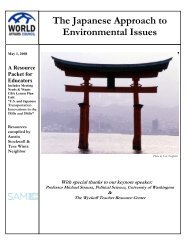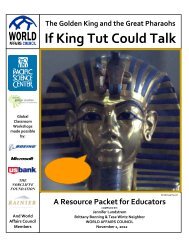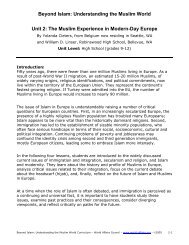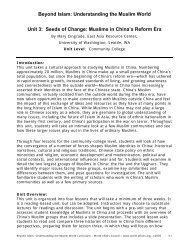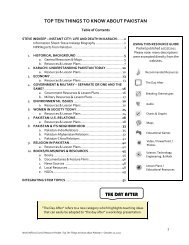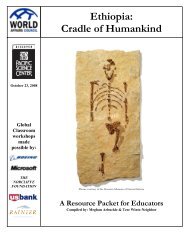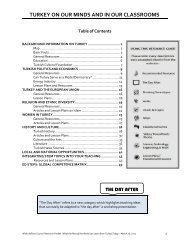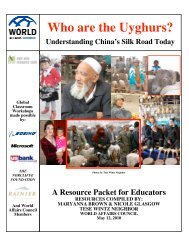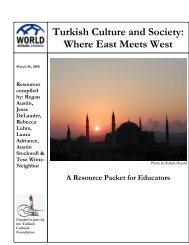The Question(s) of Tibet - World Affairs Council
The Question(s) of Tibet - World Affairs Council
The Question(s) of Tibet - World Affairs Council
You also want an ePaper? Increase the reach of your titles
YUMPU automatically turns print PDFs into web optimized ePapers that Google loves.
CHINA‐TIBET RELATIONS<br />
suggests that what matters to Beijing is not expert adjudication so much as popular consent: the Chinese authorities also<br />
see the <strong>Tibet</strong> issue as shaped not by the decisions <strong>of</strong> lawyers and leaders but by the views and beliefs <strong>of</strong> ordinary <strong>Tibet</strong>ans.<br />
Strangely, few people, and fewer <strong>Tibet</strong>ans, have chosen to argue that, given the distinct status that the Chinese<br />
emperors accorded to <strong>Tibet</strong> compared to their provinces, <strong>Tibet</strong> must at best have been something like a colony. If this<br />
argument was pursued – and it is hard to contest – the present situation could be described as one <strong>of</strong> colonial occupation. It<br />
is one <strong>of</strong> the mysteries (some people might say tragedies) <strong>of</strong> the <strong>Tibet</strong>an case that its leaders in exile and their advisers have<br />
sought to show that <strong>Tibet</strong> has a right to absolute statehood, perhaps gambling to attract Western support, rather than to<br />
seek its people’s right to decolonization, an option that might have gained them wider support in the developing world.<br />
But these are in essence questions <strong>of</strong> strategy and definition, matters that are decided by political elites. At the<br />
fundamental, everyday level at which most <strong>of</strong> us operate, the reality is that, as far as we can tell, the majority <strong>of</strong> <strong>Tibet</strong>ans do<br />
not accept their current masters as legitimate rulers. It is difficult otherwise to explain the thousands <strong>of</strong> <strong>Tibet</strong>ans who since<br />
1950 have taken part in the revolt, in the guerrilla war, on in civil protests, who have been to prison or have been executed<br />
for holding such views, or who have fled as refugees. <strong>The</strong> numbers involved in these actions are too great to be discounted<br />
as all members or beneficiaries <strong>of</strong> the political elite whose power and wealth was jeopardized by the Chinese advance to<br />
Lhasa.<br />
(Excerpt from <strong>The</strong> <strong>Tibet</strong>ans: A Struggle to Survive pp. 180‐182)<br />
For the Chinese, pre‐1950 <strong>Tibet</strong> was a hell on earth ravaged by feudal exploitation. <strong>The</strong>re are no redeemable features<br />
in <strong>Tibet</strong>an culture and tradition. This view is fostered by traditional Chinese prejudice against non‐Chinese people. <strong>The</strong><br />
Communists not only believe that they have succeeded in unifying China but that their rule in <strong>Tibet</strong> has constituted the<br />
liberation <strong>of</strong> the serfs and a continuous history <strong>of</strong> development and progress towards modernity.<br />
For the <strong>Tibet</strong>ans the image could not be more different. Before the Chinese invasion their country was a land <strong>of</strong><br />
‘happy’ and ‘contented’ people. Chinese rule has not only meant the destruction <strong>of</strong> <strong>Tibet</strong>ans’ independent political identity<br />
but (they maintain) four decades <strong>of</strong> near‐genocide <strong>of</strong> the <strong>Tibet</strong>an people and their culture. <strong>The</strong> gulf between the two<br />
positions is as wide as heaven and earth, and it is impossible to reconcile them.<br />
Both are part <strong>of</strong> political myth‐making, in which these powerful symbols are invoked to justify and legitimize the<br />
claims <strong>of</strong> the proponents. For the Chinese it has been a political necessity to paint a dark and hellish picture <strong>of</strong> the past in<br />
order to justify their claim to have ‘liberated’ <strong>Tibet</strong>, a claim which is based only partly on a legal insistence that <strong>Tibet</strong><br />
constituted and integral part <strong>of</strong> the PRC. <strong>The</strong> logic <strong>of</strong> the argument is the same as the belief held by Western colonial<br />
powers that their rule has been a civilizing influence on the natives in their dominions. For the <strong>Tibet</strong>ans, particularly for<br />
those who experienced firsthand the oppression <strong>of</strong> the past four decades, regaining the past has become a necessary act <strong>of</strong><br />
political invocation, which allows them to escape from a reality which has deprived them <strong>of</strong> their future. <strong>The</strong>y find meaning<br />
and identity in glorification <strong>of</strong> the past, when the land <strong>of</strong> snows was the exclusive terrain <strong>of</strong> the <strong>Tibet</strong>an people.<br />
Neither the <strong>Tibet</strong>ans nor the Chinese want to allow any complexities to intrude on their firmly held beliefs. This has<br />
resulted in what I have called ‘denial <strong>of</strong> history’, a process which necessarily entails negation <strong>of</strong> responsibility. <strong>The</strong> <strong>Tibet</strong>an<br />
elite claims its actions are entirely blameless, seeking to give an image <strong>of</strong> total innocence and to portray the Chinese actions<br />
as the rape <strong>of</strong> an innocent people. It is difficult for the <strong>Tibet</strong>ans to admit that they were not merely a passive agent in their<br />
recent history <strong>of</strong> that there was a much more complex issue surrounding the relationship between <strong>Tibet</strong> and China. In the<br />
early 1950’s there was a consensus among <strong>Tibet</strong>’s secular and religious ruling classes that Buddhist <strong>Tibet</strong> and Communist<br />
China could co‐exist and, accordingly, they co‐operated fully with the Chinese. Moreover, there were many people in <strong>Tibet</strong><br />
who welcomed the Chinese as a modernizing influence.<br />
Similarly the Chinese leaders refuse to see the question <strong>of</strong> <strong>Tibet</strong> in terms <strong>of</strong> the desires and wishes <strong>of</strong> the <strong>Tibet</strong>an<br />
people. For the Chinese to acknowledge that <strong>Tibet</strong> had a recent history and a personality would amount to an acceptance<br />
<strong>of</strong> <strong>Tibet</strong>’s separateness from China. Chinese policy towards <strong>Tibet</strong> stems from two ideas which have shaped modern China:<br />
first, Chinese nationalism, which attaches great importance to the humiliation <strong>of</strong> China under Western imperialism and<br />
leads the Chinese to interpret <strong>Tibet</strong>’s demand for independence as an externally generated conspiracy to dismember China,<br />
a view consistently held by successive Chinese regimes from the Qing to the Guomindang and the Communists. <strong>The</strong>refore,<br />
all Chinese leaders since the later Qing have adopted a policy <strong>of</strong> incorporating <strong>Tibet</strong> within the greater policy <strong>of</strong> China. In<br />
this scheme <strong>of</strong> things, it does not matter what the <strong>Tibet</strong>ans thing or want: <strong>Tibet</strong> is part <strong>of</strong> China. <strong>The</strong> second formative<br />
view adopted by the Chinese is a narrow Marxist economic determinist view <strong>of</strong> national identity, which sees it as product <strong>of</strong><br />
economic disparity, and argues that once economic inequality is removed, there would occur a natural withering <strong>of</strong> ethnic<br />
differences.<br />
(Excerpt from <strong>The</strong> Dragon in the Land <strong>of</strong> Snows: A History <strong>of</strong> Modern <strong>Tibet</strong> Since 1947 by Tsering Shakya<br />
<strong>World</strong> <strong>Affairs</strong> <strong>Council</strong> Teacher Resource Packet – <strong>The</strong> <strong>Question</strong>(s) <strong>of</strong> <strong>Tibet</strong> February 28, 2011<br />
30



